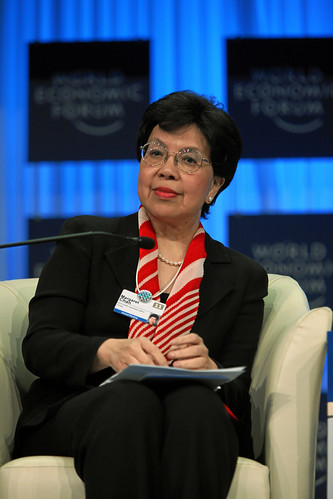Counterfeits By Any Other Name Still Endanger Patient Safety, Says World Health Organization and IFPMA

Dr. Margaret Chan Director-General World Health Organization
by World Economic Forum via Flickr.
On February 28, 2011, Dr. Margaret Chan, Director-General of the World Health Organization, said that the World Health Organization does not conflate intellectual property issues with those of patient safety in their concerns for counterfeit medication proliferation.
Opening the Work Group of Member States on Substandard /Spurious /Falsely-labelled /Falsified /Counterfeit Medical Products in Geneva Switzerland she said that the World Health Organization’s “first priority [is] for public health…to protect populations from the harm caused by poor-quality, unsafe medicines.”
Dr. Chan went on to say that patient safety is compromised when quality, safety and efficacy of medications are questionable due to substandard and inactive ingredients, poor manufacturing practices, improper packaging, transport, storage and product deterioration. The root cause of these breakdowns in medicine quality, says Dr. Chan, is inadequate capacity of national drug regulatory authorities.
Developing countries can solve these problems and protect their populations by using the same methods as wealthy nations, says Dr. Chan, by developing “strict regulatory control of medicines on the market, strict enforcement of quality standards, and diligent pharmacovigilance.”
Dr. Chan went on to say that WHO aggressively supports the development of legitimate generic medications that will be more affordable for patients and is not interested in beefing up intellectual property regulations at the expense of the development of generics.
These efforts are supported by the IFPMA, as detailed in the IFPMA’s article “Building a Consensus to Address the Health Threat Posed by Fake Medicines” written by Eduardo Pisani, Director-General of IFPMA, on February 25, 2011. The IFPMA supports the WHO’s goals, saying that it is important that the WHO continue to “ to play an active and visible leadership role in helping to ensure that medicines everywhere are of high quality, safe and efficacious, and that they are also what they purport to be.”
Pisani goes on to say that if the Work Group pulls the WHO’s efforts to secure safe medicines back significantly, it would be detrimentally dilute the coordination of international efforts to secure safe medicines, and it would signal a shift away from the importance of pharmacovigilance.
Says Pisani, “Medicine quality is an issue that requires a broad effort, across a very diverse range of stakeholders. This requires building consensus around priorities and encouraging flexibility on the part of key stakeholders, so the leadership function of the WHO is particularly important.”
IFPMA goes on to support Dr. Chan’s desire to develop legitimate generic medications adding that “Manufacturers of legitimate generic medicines have nothing to fear from efforts to address this issue. Indeed, counterfeiters threaten the full spectrum of legitimate medicines, including generics.” Additionally, EFPIA has said it will not use the EU’s powers of customs detention to interfere with the transportation of generic medicine and that India and the EU have reached a similar agreement.
Says Pisani, “The Ten Principles on Counterfeit Medicines, confirm our belief that ‘counterfeits’ are a crime against patients, which endangers global public health. More importantly they spell out that ‘patents have nothing to do with counterfeiting and counterfeiting has nothing to do with patents.’”
Dr. Bryan Liang, from the board of the Partnership for Safe Medicines, applauds these developments. “A few self-interested actors should not stop global efforts to ensure safety of the drug supply. Patient safety should not be a chip played in a political game.”